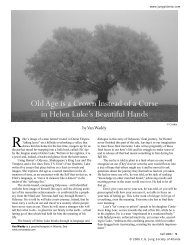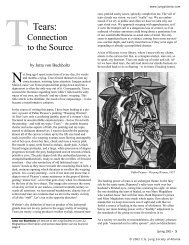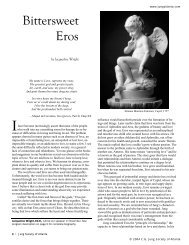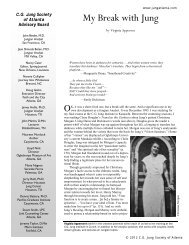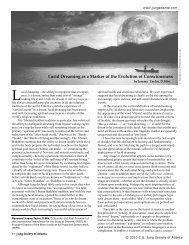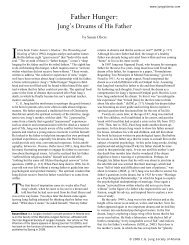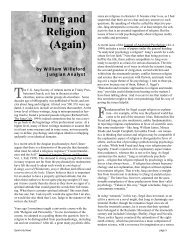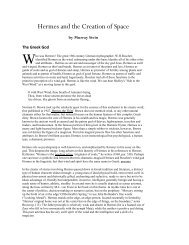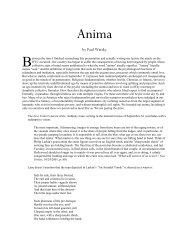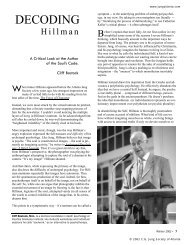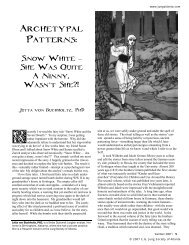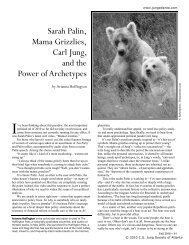Cleaning Clutter… and More - C.G. Jung Society of Atlanta
Cleaning Clutter… and More - C.G. Jung Society of Atlanta
Cleaning Clutter… and More - C.G. Jung Society of Atlanta
You also want an ePaper? Increase the reach of your titles
YUMPU automatically turns print PDFs into web optimized ePapers that Google loves.
© Photographer: Agencyby, Dreamstime.com<br />
I<br />
t is the beginning <strong>of</strong> another New Year, bringing with it<br />
possibilities <strong>of</strong> new beginnings <strong>and</strong> resolutions about new<br />
ways <strong>of</strong> living. The collective messages tell us it’s the<br />
perfect time to clear out our clutter <strong>and</strong> get organized. So, like<br />
many other folks, I head to the store to purchase all <strong>of</strong> the bins,<br />
containers <strong>and</strong> other products that will help me with the process<br />
<strong>of</strong> cleaning my own clutter <strong>and</strong> getting organized. I imagine<br />
how much better I am going to feel when I go to look for a file<br />
<strong>and</strong> it’s neatly labeled <strong>and</strong> correctly situated in my file cabinet.<br />
Or how much time <strong>and</strong> energy I’m going to save by being able<br />
to easily put my h<strong>and</strong>s on a particular quote or book that I need.<br />
Or the enjoyment I will have when I am able to view my photographs<br />
displayed in albums or on discs instead <strong>of</strong> scattered in<br />
boxes. Life will be different.<br />
But when the excitement <strong>and</strong> the visions <strong>of</strong> a new way <strong>of</strong><br />
living come face to face with the actual task, something<br />
changes. As I sit surrounded by the growing upheaval <strong>and</strong><br />
Jacqueline Wright is a <strong>Jung</strong>ian analyst in private practice in<br />
<strong>Atlanta</strong>, working with individuals <strong>and</strong> couples. She received her<br />
doctorate in Counseling from the University <strong>of</strong> Memphis <strong>and</strong> her<br />
diploma in Analytical Psychology from the C.G. <strong>Jung</strong> Institute, Zurich.<br />
She is a past president <strong>of</strong> the Georgia Association <strong>of</strong> <strong>Jung</strong>ian<br />
Analysts, a training analyst <strong>and</strong> current Chair <strong>of</strong> Admissions in the<br />
Inter-Regional <strong>Society</strong> <strong>of</strong> <strong>Jung</strong>ian Analysts, <strong>and</strong> faculty member <strong>of</strong><br />
the New Orleans <strong>Society</strong> <strong>of</strong> <strong>Jung</strong>ian Analysts.<br />
<strong>Cleaning</strong><br />
<strong>Clutter…</strong><br />
<strong>and</strong><br />
<strong>More</strong><br />
Jacqueline Wright, EdD<br />
www.jungatlanta.com<br />
chaos created by the piles <strong>of</strong> papers, books, photos <strong>and</strong> keepsakes<br />
I’m trying to sort through, my mind <strong>and</strong> body begin to<br />
falter at the Herculean task in front <strong>of</strong> me. What was I thinking?<br />
Why didn’t I leave well-enough alone? I hear the voice in my<br />
head that says “it will just have to be done again in another year<br />
or two.” As I haul trash bag… after trash bag…after trash bag<br />
down the stairs <strong>and</strong> out to the garbage pickup, I’m reminded <strong>of</strong><br />
Sisyphus hauling the stone up the hill over <strong>and</strong> over only to<br />
have it fall back down again. I am caught by the absurdity <strong>of</strong><br />
the task I’m engaged in <strong>and</strong> have to fight the desire to flee. But<br />
I persevere <strong>and</strong> stay with the project. It is indeed “Sisyphus<br />
work.”<br />
Even more difficult perhaps than the physical part <strong>of</strong> the<br />
task is the mental aspect, <strong>of</strong> making decisions about what to<br />
keep <strong>and</strong> what to throw away. I’m <strong>of</strong>ten caught in the paralyzing<br />
position <strong>of</strong> not being able to decide between letting go or<br />
holding on to something. Item after item pulls <strong>and</strong> tugs at me to<br />
take a st<strong>and</strong>. Of course if my courage fails me, I can always<br />
(<strong>and</strong> sometimes do) trick myself by just placing the items in<br />
new folders or containers <strong>and</strong> putting them back where they<br />
were. This <strong>of</strong> course guarantees that I’ll probably find myself<br />
caught in the same position in the future, sorting through the<br />
very same items, caught in the same dilemma. As I work to<br />
hold myself to the task, I begin to think about what might be<br />
happening on a psychological level. What is the archetype at<br />
work here?<br />
Winter 2008 • 5<br />
© 2008 C.G. <strong>Jung</strong> <strong>Society</strong> <strong>of</strong> <strong>Atlanta</strong>
Clutter is stuff we don’t need or want. It<br />
weights us down <strong>and</strong> we feel suffocated under<br />
layers <strong>of</strong> stuff. Clutter steals our time when we<br />
can’t find anything. It takes up space in our head<br />
as well as in our closets, files <strong>and</strong> shelves. It<br />
nags at us with reminders <strong>of</strong> unmade decisions,<br />
unfinished projects. It keeps us in the past,<br />
reminding us <strong>of</strong> decisions we haven’t made or<br />
things we just haven’t gotten round to yet. Clutter<br />
not only makes it hard to find anything or<br />
close the cabinets. It also makes it hard to<br />
achieve closure about anything.<br />
Mental clutter also suffocates us, steals our<br />
energy, nags at us <strong>and</strong> keeps us in the past. Some<br />
<strong>of</strong> the mental clutter that we may carry around<br />
are old beliefs that restrict us, past hurts, images<br />
<strong>of</strong> ourselves that are no longer valid or true, a<br />
false sense <strong>of</strong> responsibility, outdated family<br />
beliefs <strong>and</strong> unrealistic expectations <strong>of</strong> ourselves.<br />
Why would we want to hold on to these things if<br />
they prevent us from living more fully?<br />
Letting go <strong>of</strong> something to make a new<br />
beginning requires more than perseverance. It<br />
also requires an underst<strong>and</strong>ing <strong>of</strong> what it is<br />
within us that undermines our resolve <strong>and</strong> casts<br />
doubts about moving forward. Holding on to our<br />
physical as well as our mental clutter can be like<br />
holding on to a security blanket. It reassures us<br />
about who we are <strong>and</strong> it may also hold back the<br />
fear that we might feel if we were free to move<br />
in an uncluttered way into a new <strong>and</strong> challenging<br />
future. We are all torn between the developmental<br />
thrusts that push us forward <strong>and</strong> the impulses<br />
toward repetition <strong>and</strong> regression that aborts<br />
them. That old voice that says “Just leave it alone” or “Don’t<br />
rock the boat” or “Not now” represents that regressive pull to<br />
hang on to the security blanket a little longer in order to feel<br />
safe.<br />
A<br />
nother reason we may not be able to let go <strong>of</strong> our<br />
clutter is because we’ve adopted the hero or heroine’s<br />
stance much too long. This stance is appropriate for<br />
the first half <strong>of</strong> life, but the second half <strong>of</strong>ten calls for something<br />
else, which usually has to do with letting go. Letting go<br />
<strong>and</strong> holding on are two sides <strong>of</strong> the same coin <strong>and</strong> both attitudes<br />
are necessary. Sometimes it is important to persevere<br />
<strong>and</strong> keep rolling our stone. At other times it is important to<br />
recognize when there is no alternative but to let it go. For<br />
example, if we overreach or h<strong>and</strong>icap ourselves with unrealistic<br />
expectations, then it may be time to let go. Sisyphean<br />
behavior needs to be applied in the right life situation.<br />
We are always caught in that tension between struggling<br />
with a fruitless task or position <strong>and</strong> letting go too easily. The<br />
myth tells us that Sisyphus defied the gods <strong>and</strong> outwitted<br />
death two times, suggesting his unwillingness <strong>and</strong> refusal to<br />
accept the inevitability <strong>of</strong> death <strong>and</strong> to let go <strong>of</strong> life voluntarily.<br />
Accepting death means recognizing endings. Sisyphus’<br />
punishment (or fate) was that he was eternally bound to labor<br />
with no prospect <strong>of</strong> ever being able to let go. He became a<br />
prisoner <strong>of</strong> his own decision not to give up.<br />
6 • <strong>Jung</strong> <strong>Society</strong> <strong>of</strong> <strong>Atlanta</strong><br />
www.jungatlanta.com<br />
Franz von Stuck, Sisyphus, 1920<br />
We use many excuses for holding on to a belief, an issue<br />
or a position for too long. One <strong>of</strong> the most familiar ways is to<br />
make others responsible for things we just can’t seem to<br />
change. This is <strong>of</strong>ten most clearly seen in our relationships.<br />
Like Sisyphus, we kind <strong>of</strong> get into a groove, repeating the<br />
same dysfunctional patterns over <strong>and</strong> over again. We blame it<br />
on our partner or hope that next time things will be different,<br />
without doing the hard work <strong>of</strong> self-examination <strong>and</strong> change.<br />
Or we refuse to take a st<strong>and</strong> <strong>and</strong> make difficult choices, rolling<br />
the stone up the hill yet another time, following the same path<br />
because that is what we’re used to.<br />
The classic view <strong>of</strong> the Sisyphus story contends that<br />
Sisyphus’ labor conveys a hopelessness about one’s fate <strong>and</strong> a<br />
punishment that has been decreed by the gods. Albert Camus,<br />
the existentialist, sees Sisyphus as a figure <strong>of</strong> life. He goes on<br />
to say that the unilluminated man normally lives in hope <strong>and</strong><br />
the belief that his labor will lead to something. Sisyphus<br />
knows however, that the labor <strong>of</strong> getting his great rock up the<br />
hill will end with its rolling down again <strong>and</strong> that this grim<br />
labor will last forever (Camus, 1955).<br />
Joseph Campbell speculates about the pause that must<br />
occur before Sisyphus has to roll the stone back up the hill<br />
again. He imagines it as a breath <strong>of</strong> relief <strong>and</strong> an hour <strong>of</strong><br />
consciousness <strong>and</strong> in these moments, says Campbell, Sisyphus<br />
is superior to his destiny, stronger than his rock. If the myth is<br />
© 2008 C.G. <strong>Jung</strong> <strong>Society</strong> <strong>of</strong> <strong>Atlanta</strong>
seen as tragic, it is because its hero is conscious, for where<br />
would the agony be if at each step he were sustained by a hope<br />
<strong>of</strong> success. It becomes tragic in those moments when Sisyphus<br />
knows the whole extent <strong>of</strong> his condition (Campbell, 1968, p.<br />
422-23).<br />
Verena Kast, a <strong>Jung</strong>ian analyst, explores the Sisyphus<br />
myth in terms <strong>of</strong> the challenges we all face in dealing with the<br />
possibilities <strong>of</strong> change <strong>and</strong> the limits <strong>of</strong> growth. She points out<br />
that such issues can never be solved or eliminated, only coped<br />
with, like the stone <strong>of</strong> Sisyphus. There is no hero’s reward for<br />
Sisyphus. He is engaged in a solo task that will bring him no<br />
outside recognition.<br />
We might see the Sisyphus image as a picture <strong>of</strong> the<br />
intense engagement we undergo with our own familiar complexes.<br />
The endless repetition that Sisyphus is engaged in<br />
reflects on the one h<strong>and</strong> the apparent feeling <strong>of</strong> fruitlessness<br />
<strong>and</strong> despair that we sometimes feel as we encounter the same<br />
recurring complexes over <strong>and</strong> over. We all know that feeling<br />
<strong>of</strong> “Oh no, not this again.” We try to change, but it <strong>of</strong>ten feels<br />
like we’re getting nowhere. Kast reminds us that “…no matter<br />
how <strong>of</strong>ten the same old struggle seems to be repeated, it is the<br />
way in which we tackle it that brings us an increase in autonomy<br />
during the course <strong>of</strong> our lives. As long as we are firmly<br />
convinced that the problem must be overcome once <strong>and</strong> for<br />
all, we will be repelled at the prospect <strong>of</strong> taking up the stone<br />
once again. But if we can accept that our principle problems<br />
will show us only very little that is new, <strong>and</strong> that we can only<br />
achieve a certain amount each time, then we will hoist the<br />
stone when it is time to do so just to see how far we can get<br />
with it this time.” (Kast, 1991, p.78). This attitude amounts to<br />
embracing the rhythm <strong>of</strong> life, <strong>of</strong> confronting our limitations<br />
<strong>and</strong> the ongoing struggle we are all engaged in.<br />
<strong>Jung</strong> also reminds us that “…the greatest <strong>and</strong> most important<br />
life problems are basically unsolvable…They can never<br />
be solved but merely outgrown.” (<strong>Jung</strong>, 1929, p. 12) Change is<br />
only possible when we can let go <strong>and</strong> accept our situation, or<br />
accept that the particular complexes that we keep painfully<br />
encountering over <strong>and</strong> over will always be with us. We have<br />
to let go <strong>of</strong> our illusions in order to see the real possibilities.<br />
In this light, Sisyphus may be viewed as a resilient character,<br />
a mold for a person who perseveres <strong>and</strong> does what is<br />
possible with his assigned life task. Sisyphus continues to<br />
exert himself, is disappointed over <strong>and</strong> over again <strong>and</strong> yet<br />
refuses to run away, despite disappointments <strong>and</strong> resistances.<br />
He risks new beginnings in the face <strong>of</strong> defeat. He is a model<br />
<strong>and</strong> a reminder perhaps, about the importance <strong>of</strong> living life as<br />
intensely as possible while accepting the inevitable losses <strong>and</strong><br />
changes that occur.<br />
As I read more about Sisyphus, I find that he is connected<br />
to Hermes, the god <strong>of</strong> change <strong>and</strong> creativity. Hermes brings<br />
about connections <strong>and</strong> transitions <strong>and</strong> expresses the possibility<br />
<strong>of</strong> new beginnings <strong>and</strong> creative transformation. As a messenger<br />
<strong>of</strong> the gods, Hermes connects heaven with earth as well as<br />
earth with the underworld. He was the patron <strong>of</strong> merchants,<br />
travelers, rogues <strong>and</strong> thieves. We also find that stones <strong>and</strong><br />
gravestones were sacred to Hermes. For example, stone pillars<br />
which protected Greek houses were viewed as the residence <strong>of</strong><br />
a god <strong>and</strong> were called Herms.<br />
Because <strong>of</strong> the connection between Hermes <strong>and</strong> stones, as<br />
www.jungatlanta.com<br />
well as the connection between stones <strong>and</strong> fertility goddesses,<br />
Kast challenges us to think <strong>of</strong> the stone not just in terms <strong>of</strong> a<br />
burden but in terms <strong>of</strong> something divine that may be trying to<br />
break through into our lives. In reality, a stone may be an<br />
assigned life task <strong>and</strong> it is the Sisyphean work that ultimately<br />
facilitates the breakthrough <strong>of</strong> something divine in a human<br />
being. We know that the greatest potential for our development<br />
is usually <strong>of</strong>fered through our greatest problems. How <strong>of</strong>ten<br />
have we shouldered or been faithful to an assigned task <strong>and</strong><br />
found that it was in the very process <strong>of</strong> being faithful to the<br />
task <strong>and</strong> giving it our all that we found our greatest strength<br />
<strong>and</strong> our most divine aspects.<br />
I<br />
ndividuation is a lifelong task <strong>and</strong> we are called to meet<br />
the challenges as they present themselves to us. It is also a<br />
creative process <strong>and</strong> creative acts don’t usually happen in a<br />
single attempt. Instead, they usually require many steps, <strong>of</strong>ten<br />
with many small failures along the way. The Sisyphus myth<br />
may be viewed as a representation <strong>of</strong> an essential aspect <strong>of</strong> that<br />
creative process.<br />
Genuine changes do begin within us, but they are <strong>of</strong>ten<br />
brought to our attention by external events or circumstances or<br />
in our everyday tasks <strong>and</strong> obligations. Following the same<br />
routines in our daily lives, whether it is going from appointment<br />
to appointment, making those reminder phone calls,<br />
balancing our bank account over again or explaining our ideas<br />
for the hundredth time may seem hopelessly dull <strong>and</strong> repetitious.<br />
But these are the trivia <strong>of</strong> life from which new life may<br />
spring. It is the perseverance <strong>and</strong> attendance to the particular<br />
tasks that our life presents us with that is important <strong>and</strong> that<br />
may bring us to a deeper underst<strong>and</strong>ing <strong>of</strong> ourselves.<br />
The impetus <strong>and</strong> necessity for tackling my own physical<br />
clutter seemed to come from outer circumstances. But then I<br />
started noticing that the themes <strong>of</strong> clearing out clutter, letting<br />
go, holding on <strong>and</strong> making space for myself were popping up<br />
in many other places <strong>and</strong> situations. <strong>Jung</strong> refers to these as<br />
synchronistic events, when there is a meaningful coincidence<br />
between a state <strong>of</strong> mind or a dream <strong>and</strong> events that occur in the<br />
outer, physical world. Each synchronistic event that happened<br />
to me illuminated the greater reality that was addressing me<br />
<strong>and</strong> reinforced the link between my external project <strong>and</strong> the<br />
internal changes that needed attending to or that were already<br />
occurring.<br />
<strong>Jung</strong> <strong>of</strong>ten recognized that there is a deeper dimension to<br />
the external events that capture our attention <strong>and</strong> that they can<br />
play an important part in the process <strong>of</strong> our development.<br />
When we attempt to live meaningfully <strong>and</strong> soulfully, the distinction<br />
between external <strong>and</strong> internal world, or subject <strong>and</strong><br />
object breaks down. Sometimes the internal world speaks the<br />
loudest <strong>and</strong> acts upon us, as in a dream or through a depression.<br />
At other times the external world initiates the challenge<br />
<strong>and</strong> motivates change. Our job is to make the connection<br />
between our external <strong>and</strong> internal worlds <strong>and</strong> to be attuned to<br />
how the occurrences in both worlds are supporting our individuation<br />
process. Without the convergence <strong>of</strong> our objective<br />
<strong>and</strong> subjective experiences the full depth <strong>of</strong> our personalities<br />
will not be realized. As Thomas Merton said:<br />
“Life is not a problem to be solved, but a mystery to be lived.”<br />
Winter 2008 • 7<br />
© 2008 C.G. <strong>Jung</strong> <strong>Society</strong> <strong>of</strong> <strong>Atlanta</strong>




